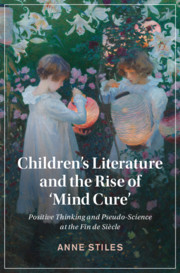 Children's Literature and the Rise of ‘Mind Cure'
Children's Literature and the Rise of ‘Mind Cure' New Thought in Henry James’s The Turn of the Screw
Published online by Cambridge University Press: 10 December 2020
Chapter two turns to Henry James’s supernatural classic, The Turn of the Screw (1898), to show the backlash of the literary intelligentsia against New Thought and the inner child. This chapter reads The Turn of the Screw as a critical response to Frances Hodgson Burnett’s Little Lord Fauntleroy that mocks the book’s saccharine portrayal of innocent children and its New Thought overtones. While siblings Miles and Flora initially resemble Lord Fauntleroy in their youth, beauty, and apparent innocence, their subsequent actions could not be more different. Whereas Burnett’s protagonist heals his grieving mother and depressed grandfather and brings them spiritual peace, Miles and Flora lead their governess to the brink of madness by consorting with evil spirits. James, who wrote so perceptively about the inner life of a child a year earlier in What Maisie Knew (1897), deliberately portrayed Miles and Flora as opaque, unsympathetic, and allied with dark forces. In so doing, he skewered New Thought's relentless idealization of children as conduits to God. He also paved the way for more recent depictions of evil children in horror fiction and in films such as The Bad Seed (1956), The Omen (1976), or We Need to Talk About Kevin (2011).
To save this book to your Kindle, first ensure no-reply@cambridge.org is added to your Approved Personal Document E-mail List under your Personal Document Settings on the Manage Your Content and Devices page of your Amazon account. Then enter the ‘name’ part of your Kindle email address below. Find out more about saving to your Kindle.
Note you can select to save to either the @free.kindle.com or @kindle.com variations. ‘@free.kindle.com’ emails are free but can only be saved to your device when it is connected to wi-fi. ‘@kindle.com’ emails can be delivered even when you are not connected to wi-fi, but note that service fees apply.
Find out more about the Kindle Personal Document Service.
To save content items to your account, please confirm that you agree to abide by our usage policies. If this is the first time you use this feature, you will be asked to authorise Cambridge Core to connect with your account. Find out more about saving content to Dropbox.
To save content items to your account, please confirm that you agree to abide by our usage policies. If this is the first time you use this feature, you will be asked to authorise Cambridge Core to connect with your account. Find out more about saving content to Google Drive.